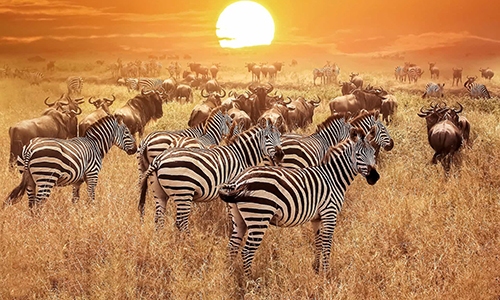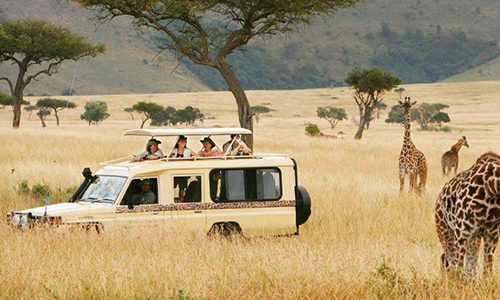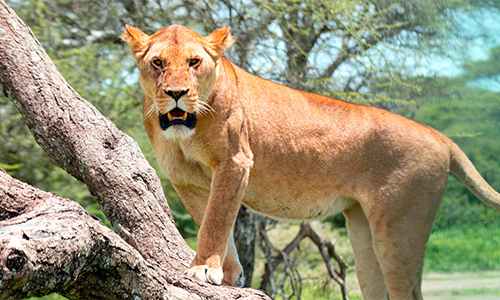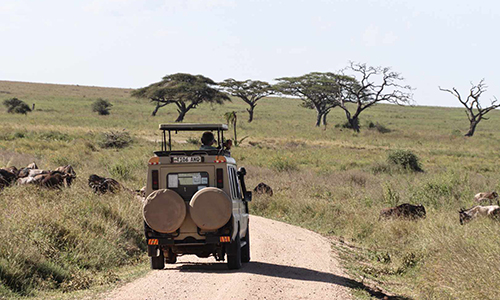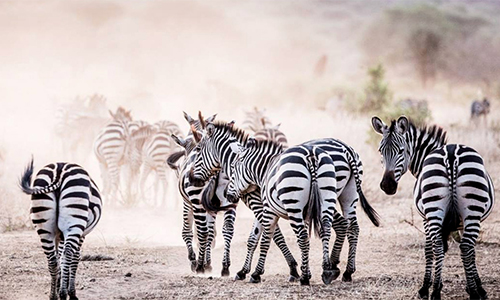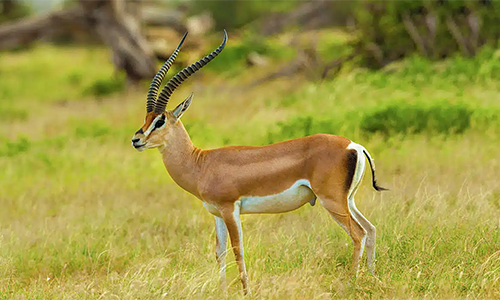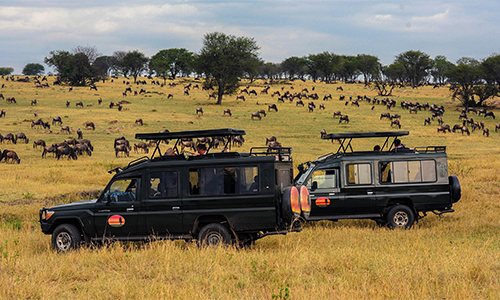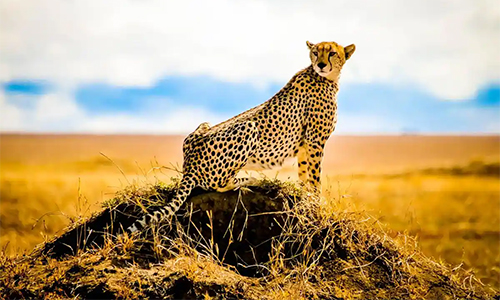Tanzania Safaris
Best of Tanzania Safaris
Tanzania Safaris
Tanzania is one of Africa’s biggest safari experiences. But with must-see destinations such as the Serengeti and Ngorongoro Crater on offer plus the allure of Zanzibar, it’s hard to know where to start when choosing your Tanzania safaris. Even more so when you want to see the Great Wildebeest Migration or bring the family! Our Tanzania safaris are an exploration of both your outer and inner self as you discover the beauty, excitement, and everything possible in our breathtaking natural world.
Bespoke Tanzania Safaris Packages
Come with us to the great Serengeti Park, alive with lions, leopards, and endless herds of wildebeest and zebra. We’ll bring you to the heart of the Great Migration, a magnificent procession of millions of herding wildlife on a timeless quest for survival.
Do other worlds exist within our own? Decide for yourself as we take you down into the planet’s largest intact volcanic caldera, the Ngorongoro – a beating expanse of 25,000 animals, set apart from the rest of Africa. The discoveries here are endless.
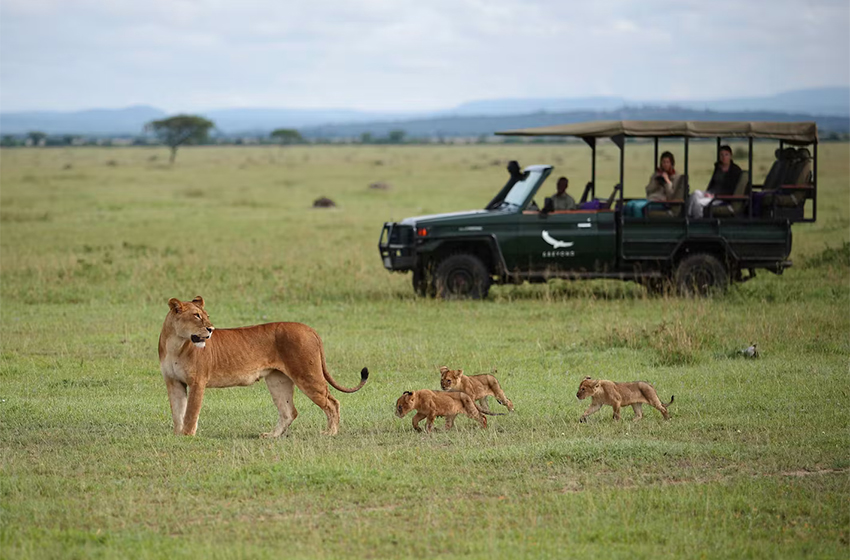
Featured Itineraries - Tanzania Safaris
FAQ’S ABOUT MOUNT KILIMANJARO AND BEST TIMES TO GO FOR A HIKE
How safe is it to travel in Tanzania?
Tanzania is a safe and hassle-free country to visit, in general. Tourists will be safe in Tanzania as long as they travel with a local tour operator instead of opting to travel independently. It is advisable for visitors to take the precautions and follow all government travel advisories in order to avert any untoward incident while traveling in Tanzania. Incidences of terrorism are rare in Tanzania and general crimes like petty thefts, street mugging and bag-snatchings can be evaded by simply staying away from the crime hotspots. Avoiding secluded areas, traveling alone after dark, respecting the sense of local dress-up and carrying minimum cash or valuables while strolling around are some ways of staying safe in this wonderful country. Also, try not to use a bag-pack and use a taxi in the night time in the cities.
How safe is the water and food in Tanzania?
First and foremost, it is to be clear that food and water-borne illnesses can happen in any country that you travel. All you need to do is maintain a good level of personal sanitation while traveling and take some precautionary measures while consuming your food and drinking water.
For the most part, Tanzania’s food is safe to eat. However, it is advisable not to eat cold or pre-prepared foods and reheated food, for example in street stalls or hotel buffets. Likewise, drinking tap water is very unsafe in Tanzania. To avoid any kind of health hazards, we recommend drinking bottled, treated or filtered water. Using bottled water for brushing your teeth is also a beneficial option to stay away from any bacterial infection. We do not recommend eating raw fruits or vegetables that have not been peeled. Even if you eat some fruits, make sure to wash them properly with filtered or bottled water. The ice content in your drinks is not safe as well – you don’t know the source of the water used to make ice, so better stay off from it! It is best to avoid salads and eat your dairy products that are pasteurized.
Will I be able to experience some of the cultures of Tanzania?
When you are in Tanzania, there will lots of opportunities to intermingle with the local people who are very friendly with foreign tourists. You will definitely be able to experience some of the cultures of Tanzania depending on how much time you wish to spend in the country. Swahili is a culture of Arab-African mix prevalent in Tanzania with other big Asian communities, particularly Indians in the urban areas. The Maasai tribes inhabiting the rural areas, especially in the northern regions are among the best known populations having distinctive customs and red robes.
To explore some of the best cultural experiences in Tanzania, you must not miss the following:
- Meet the Maasai in the Ngorongoro Crater Highland region.
- Celebrate Mwaka Kogwa, the Shirazi New Year, at Makunduchi Village.
- Explore the historical Kilwa Ruins.
- Meet the Hadzabe around Lake Eyasi.
- Attend the colorful Wanyambo festival.
- Visit Stone Town, a culturally rich Swahili coastal trading town.
What wildlife will I see on a Tanzania Safari?
The African continent is blessed with abundant wildlife, birds, flora, and cultural history. Tanzania is such a country that has one of the best wildlife bionetworks. During your safari tour in Tanzania, you will most likely catch sight of The Big Five – Elephants, Rhinoceros, Cape buffalos, Lions, and Leopards. Besides, you will also get to spy on other animals such as zebras, antelopes, giraffes, African wild dogs, monkeys, apes, chimpanzees, hippos, wildebeests, hyenas, jackals, cheetahs, and gazelles. Apart from the wildlife, you will also get an opportunity to see birds like hornbill, trogon, weaver, flamingos, flycatcher, secretary bird, tinker bird, and many more.
What kind of accommodation is available in Tanzania?
You will find a number of accommodation options on your Tanzania holidays. Luxurious lodges can be found in the national park regions and safari circuits that may vary greatly from a three to five star level. Heritage buildings have been used for accommodation in the winding alleys of Stone Town while sprawling resort style accommodations will be found on the Zanzibar Island. Hotels in Tanzania vary from the expensive luxury hotels in cities and popular tourist areas to mid-range universal and cheap BB hotels in the regional towns.
There are safari lodges and public campsites in all national parks and game reserves. Luxury tented camps have the amenities similar to that of a hotel or a lodge with en-suite bathrooms, restaurants and swimming pools while simple camps have basic facilities including toilets and showers. Most of the lodges are basic aimed at families and tour groups while a few top-end luxury lodges come in an exorbitant price. Most visitors who come to climb Mt. Kilimanjaro will sleep in the tents during their climb, or at huts in some of the climbing routes.
Do I need a visa to travel to Tanzania?
Visitors to Tanzania must acquire a visa from one of the Tanzanian embassies or apply online for an e-visa unless they belong to a visa exempt country or eligible to obtain a visa on arrival. Citizens of some countries and territories can visit Tanzania without a visa for a period of 3 months. Diplomats and special passport holders of Brazil, China, India and Turkey do not require a visa to enter Tanzania. Nationals of some specified countries need to obtain a visa in advance as they need consent from the Commissioner General of Immigration.
For more details on visa issues of Tanzania, you may visit the following websites:
https://www.worldtravelguide.net/guides/africa/tanzania/passport-visa/
What currency is used throughout Tanzania?
The currency used throughout the country is the Tanzanian shilling. Mastercard and Visa are widely accepted and there are many ATMs dispensing local currency throughout the country.
Do i need any vaccination to travel Tanzania?
The Center for Disease Control and Prevention (CDC) and World Health Organization (WHO) recommend the following vaccines for Tanzania travel: hepatitis A, hepatitis B, typhoid, yellow fever, rabies, meningitis, polio, measles, mumps and rubella (MMR), Tdap (tetanus, diphtheria and pertussis), chickenpox, shingles, pneumonia, and influenza.
Malaria, dengue and chikungunya exist in Tanzania. Although vaccination is not required, mosquito repellants and netting can help protect against both malaria and dengue. A yellow fever vaccination certificate is required by all travelers coming from an infected country. Meningitis is a periodic risk, so vaccination is advised. Rabies and cholera are also present in Tanzania. So, those visitors who are at high risk, it is safe if you consider vaccination before coming to Tanzania. For more details on vaccination requirement, you may visit the following portals:
https://www.passporthealthusa.com/destination-advice/tanzania/
https://wwwnc.cdc.gov/travel/destinations/traveler/none/tanzania
